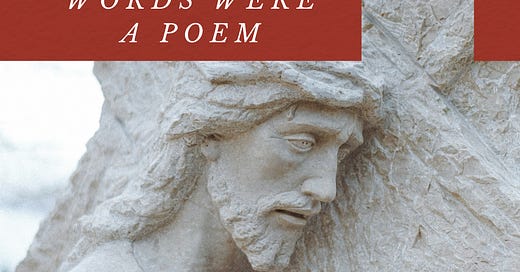by Abram Van Engen
When I was young, my mother’s friend died of multiple sclerosis. The disease took her gradually. First, she lost her singing voice. Then walking. Then eating. Then her speaking voice went as well. And yet, when she came to die, my mother’s friend mouthed the hymns she had known and loved and lived with all her life. She passed with a poem on her lips.
I think of my mother’s friend whenever I read the passage of Christ’s passion and hear again his dying breath. In Matthew, his suffering ends with a poem: “My God, my God, why have you forsaken me?” Christ exhales, and then, as the King James Version has it, he yields up his ghost.
This last line of Christ’s is the first line of Psalm 22. Almost any biblical scholar will tell you that, and most lay people know it too. Yet when I hear anyone actually talk about this moment, I almost always see them jump to the meaning of it, the message supposedly hidden in the psalm itself.
In Psalm 22, the poet laments. He is persecuted, afflicted, surrounded, oppressed. “All they that see me laugh me to scorn,” the psalmist declares. This one trusted in the Lord, scoffers proclaim, so let the Lord deliver him now. They pierce his hands and feet. They divide his clothes and cast lots for his garments. The psalmist’s torment seems to match almost exactly the torments of Christ. And it seems clear that Christ sees himself here, in this psalm, finding his voice in the voice of the poem. Insofar as Christ cites it as his death, Psalm 22 offers a prophetic puzzle to decipher the meaning of his crucifixion.
What I don’t hear people much discussing or noting or caring about in Christ’s last poem is the fact that it is a poem. He goes, with his final breath, to poetry. Verses mark the passage from life into death.
The psalms were Christ’s hymns. They remained the main songs of the early church and the Reformation, and they remain the basic verses of the faith on through to the present day in many liturgies and traditions. They have been translated and set to music a thousand thousand times for a thousand thousand different peoples. The psalms are the first poems of the church, the cries of the Body of Christ set to verse.
Perhaps then, just maybe, Christ turned to Psalm 22 with his dying breath not because he was trying to leave one last cryptic message for his followers. Maybe, instead, he turned to an ancient hymn of his tradition for comfort. Maybe he sought God in his dying hour with a psalm he had always known and long sung. Maybe he sought the connection that comes in a special way through the psalms and the hymns and the poetry that marks a lifetime of faith.
Poems run deep. They travel with us through our many ages and stages. They show up in odd places and come back in odd moments. But like a steady drip of water, a single poem met a thousand times through the course of a life can reshape the hard rock of our hearts. It can bore a hole right through us, so that when the heart comes to its final beats, it pulses with a poem said and sung across a life.
Poems do that. Hymns and psalms, the lived-sung stuff of faith, the verses of believing—it runs deep. We repeat and repeat and repeat them. We rehearse and remember them. We twine our lives around poems that sometimes we never even recognize as poetry, and yet, when all else has fled—when singing, walking, eating, and even talking have each abandoned us—our mouth still forms the words of the poems we have always known, those words grooved so deep that the heart beats the echoes of each verse.
Maybe that’s what it was for Jesus up on that cross in the darkest, dire hour. Maybe Christ turned finally to his own human need—to the God he desperately desired and sought and loved, to the hymns he had known that had always brought him close, to a poem he had rehearsed since childhood, this lament, this cry, this hope, this comfort contained (as so often it is) in verse.
Never doubt the deepness of poetry. Christ proved it on the cross.
Abram Van Engen is Stanley Elkin Professor of Humanities at Washington University in St. Louis and Executive Director of The Carver Project . He is the author of Word Made Fresh: An Invitation to Poetry for the Church, and he also serves as co-host of the podcast Poetry For All.





Thank you. That was beautiful. I love the paragraph that begins, Poems run deep….They travel with us through our many ages and stages. They show up in odd places and come back in odd moments. But like a steady drip of water, a single poem met a thousand times through the course of a life can reshape the hard rock of our hearts. It can bore a hole right through us, so that when the heart comes to its final beats, it pulses with a poem said and sung across a life
Awesome reflection on this! I was literally just reflecting on this in my recent essay, too. I noticed that there's even a deeper connection across the entire Biblical narrative and cosmic story that often has poetry and song being given as the last thing before death. I noticed how God gives Moses a song before he passes, and that ignites the tradition of sanctifying song and poetry, which Jesus then steps into further with what you've pointed out here.